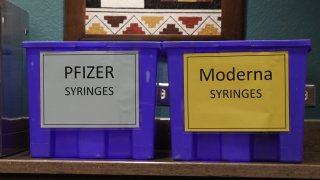
- In rare circumstances, it's OK for people to receive one shot of Pfizer's COVID-19 vaccine and one shot of Moderna's vaccine at least 28 days apart, the CDC said in updated guidance.
- The CDC says the two products are not interchangeable.
- The agency acknowledged that it hadn't yet studied whether its new recommendations would change the safety or effectiveness of either vaccine.
The Centers for Disease Control and Prevention quietly changed its guidance on COVID-19 vaccine shots, saying it's now OK to mix Pfizer and Moderna's shots in "exceptional situations" and that it was also fine to wait up to six weeks to get the second shot of either company's two-dose immunization.
While Pfizer and Moderna's vaccines, which both use messenger RNA technology, were authorized to be given 21 and 28 days apart, respectively, the agency now says you can receive either shot so long as they are given least 28 days apart, according to new guidance posted on its website Thursday.
Although "every effort" should be made to ensure a patient receives the same vaccine, in rare situations "any available mRNA COVID-19 vaccine may be administered at a minimum interval of 28 days between doses" — if supplies are limited or the patient doesn't know which vaccine they originally received, the CDC's new guidance says.
The CDC says the two products are not interchangeable, and acknowledged that it hadn't yet studied whether its new recommendations would change the safety or effectiveness of either vaccine.
The agency said health-care providers should give patients a vaccination record card that tells them when they received their first shot and which kind of shot it was to help ensure that patients know which shot they ought to receive the second time. The agency also recommends that providers enter the patient's vaccination information into their medical records and the government's immunization information system.
Both companies require two doses to achieve maximum protection from the coronavirus. While both shots should be administered according to the originally recommended guidelines, the CDC said the second dose of either companies' vaccine could be delayed as long as six weeks if necessary.
Money Report
The updated guidance comes as some cities and counties across the country are canceling vaccine appointments because they don't have as many doses as they originally expected.
Wayne County, Michigan, for example, said last week it would prioritize making sure that people who got their first shot get their second shot on time. But the county said it had to cancel almost 1,400 appointments for people to get their first shot.
"The intent is not to suggest people do anything different, but provide clinicians with flexibility for exceptional circumstances," Jason McDonald, a spokesman for CDC, said in an email to CNBC.
Dr. Nancy Messonnier, director of the CDC's National Center for Immunization and Respiratory Diseases, was asked Friday about the interval at which the two shots should be administered.
"The data that we have is on a two-dose vaccine at the recommended schedule, 21 or 28 days," she said at a virtual event hosted by the Harvard T.H. Chan School of Public Health and National Public Radio. "At this point we at CDC agree with what FDA has said and FDA has been very clear that we should be using the approved regimen."
"It's rooted solidly in the science and the available evidence, and to do something different than that would be not following the science and potentially not allowing us to really realize the full potential of these vaccines," she added. "So for now, from the CDC perspective, we think that it has to be two doses on the recommended schedule."






